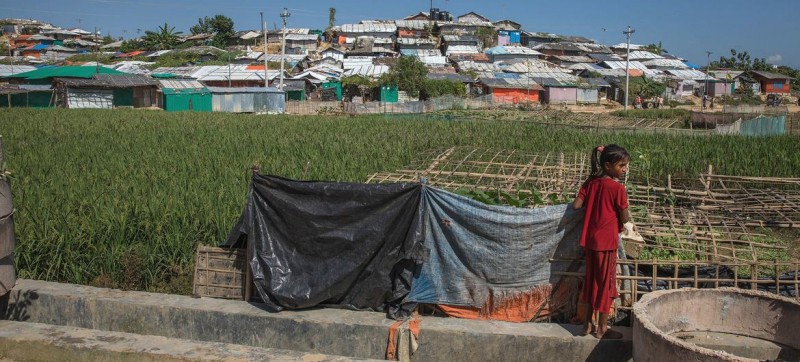Bangladesh has provided shelter to Rohingya refugees from Myanmar following five separate outbreaks of violence and persecution. The political crisis unleashed in Myanmar following the 1 February military coup last year, has “opened new frontlines that had long been at peace,” the UN Special Envoy told the General Assembly on Monday, noting that challenges in the country have “both deepened and expanded dramatically.” Noeleen Heyzer said that since she took up the job six months ago, Myanmar has “continued to descend into profound and widespread conflict”. Already one of the world’s largest refugee emergencies, she reminded that multidimensional crises there have left over one million internally displaced people (IDPs) across the country with “serious regional and international ramifications”.
Happening today: General Assembly is briefed by Special Envoy Noeleen Heyzer on the conflict and multidimensional crisis in Myanmar. Happening now in the Trusteeship or via @UNWebTV https://t.co/VkMZREJH7m pic.twitter.com/47zamXlJaj
— Paulina Kubiak Greer (@KubiakPG) June 13, 2022
Nearly one million mainly Muslim Rohingyas live in refugees camps in neighbouring Bangladesh, and hundreds of thousands of others are scattered across the region.
‘Disillusioned’ generation
This crisis has resulted in collapsing State institutions, disrupting social and economic infrastructure – including health, education, banking, food security and employment – while increasing criminality and illicit activities.
And over the past five years, the number of people living in poverty has doubled to encompass half the population.
“Today, 14.4 million people, or one-quarter of the entire population of Myanmar urgently require humanitarian assistance,” said the Special Envoy.
At the same time, following the COVID-19 pandemic and political crisis, school enrolment has dropped by up to 80 per cent in two years, leaving at least 7.8 million children shut out of the classroom.
“A generation that benefitted from the democratic transition is now disillusioned, facing chronic hardship and, tragically, many feel they have no choice left but to take up arms,” she warned.
Conflict, the norm
As military violence and distrust have continued to deepen, including against peaceful protestors, armed conflict “has become the norm” for all Burmese.
“The military continues its disproportionate use of force, has intensified its attack on civilians and increased operations against resistance forces, using aerial bombings,” said the senior UN official. “Civilian buildings and villages have been destroyed by fire and internally displaced populations have been attacked”.
Meanwhile, there are reports of up to 600 armed resistance groups, or “people’s defense forces” engaged in fighting, with some conducting assassinations targeting those seen as “pro-military”.

Protesters attend a march against the military coup in Myanmar.
Feel of abandonment
Ms. Heyzer said she was continuing to work closely with the Association of Southeast Asian Nations (ASEAN) to de-escalate hostilities.
However, she pointed out that continued differences, regionally and more broadly among UN Member States, “have left the people of Myanmar feeling abandoned in their time of need.”
“I will continue to play a bridging role…in Myanmar, in the region, and the international community to address the protection needs and suffering of the most vulnerable, and to support the will of the people for a future federal democratic union based on peace, stability and shared prosperity.”
Remembering the Rohingya
Instability and conflict place vulnerable communities at further risk, including the Rohingya.
The Special Envoy has developed a multi-track strategy that focuses on humanitarian and protection needs; a return to civilian rule; effective and democratic governance; and durable solutions for the Rohingya – the majority of whom fled following violent persecution by Government forces in 2017, characterized by the then UN human rights chief as a text-book example of ethnic cleansing.
“Sustainable solutions for the Rohingya people must be built into the design of a peaceful, inclusive and democratic Myanmar,” she said.
‘Face of human tragedy’
In direct contact with the Burmese people, Ms. Heyzer said: “I have learned the face of human tragedy behind these figures.”
Rohingya refugee women shared with her how prolonged camp displacements in Bangladesh and elsewhere, have affected their daily lives and limited opportunities to build skills and livelihoods.
They also mentioned that camp shops in Cox’s Bazar and community-run learning centres have shuttered.
“Women also told me of the many protection risks that face women and girls, including trafficking, child marriage and sexual violence”, she stated. “They described how the lack of accountability has normalized violence against women and girls in the camps.”

A young girl in Myanmar whose education has been disrupted by the COVID-19 pandemic.
Durable solutions
Ms. Heyzer advocated for “integrated and inclusive humanitarian, peace and development action” to strengthen rights and support Rohingya.
Turning to the Rakhine Advisory Commission, which aims to improve conditions in Rakhine state, from which many Rohingya fled north across the border, she told the General Assembly that she supported their recommendations for changes at both a “vertical” level – involving the de-facto authorities, pro-democracy actors and the separatist ethnic militia known as the Arakan Army – and the “horizontal”, such as grassroots initiatives that promote inclusivity, peaceful co-existence, and equality for all.
Ultimately, she said, it was “Myanmar’s responsibility” to address these fundamental issues.




Comments are closed.